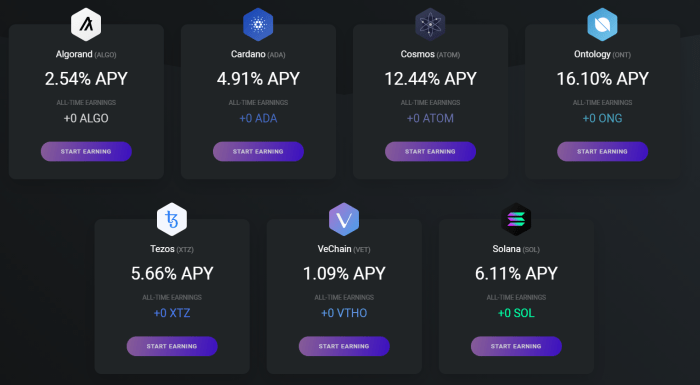Crypto staking rewards are the latest trend in the digital currency world, allowing users to earn passive income by simply holding their coins. Imagine getting paid just for keeping your crypto assets safe and secure! This guide will walk you through everything you need to know about crypto staking rewards, from how they work to the benefits and risks involved. Get ready to dive into the world of staking and start earning rewards today!
Introduction to Crypto Staking Rewards
Crypto staking rewards are incentives offered to users who participate in the process of staking their cryptocurrency holdings. Staking involves holding a certain amount of coins in a cryptocurrency wallet to support the network’s operations and validate transactions.
How Crypto Staking Rewards Work
When users stake their coins, they are essentially helping to secure the network and maintain its functionality. In return for their contribution, users receive staking rewards, which are typically paid out in the form of additional coins of the same cryptocurrency.
Examples of Cryptocurrencies that Offer Staking Rewards
- Ethereum (ETH): Ethereum is a popular cryptocurrency that allows users to stake their coins and earn rewards through its Ethereum 2.0 upgrade.
- Cardano (ADA): Cardano is another cryptocurrency that offers staking rewards to users who participate in its proof-of-stake consensus mechanism.
- Tezos (XTZ): Tezos is known for its staking rewards program, where users can delegate their coins to validators and earn rewards for securing the network.
Benefits of Crypto Staking Rewards

Crypto staking rewards offer several advantages in the blockchain space, making it an attractive option for investors looking to earn passive income and contribute to network security.
Earning Passive Income
- By participating in staking, investors can earn rewards in the form of additional cryptocurrency tokens. This provides a passive income stream without the need for active trading.
- Staking rewards offer a way to generate returns on investments while holding onto assets, unlike traditional investment options that may require frequent buying and selling.
Enhanced Network Security
- Staking rewards incentivize participants to hold onto their tokens and actively contribute to the network by validating transactions. This helps secure the blockchain network against malicious attacks.
- Compared to traditional investment options, staking rewards play a direct role in maintaining the integrity and decentralization of the blockchain ecosystem.
Contribution to Blockchain Ecosystem, Crypto staking rewards
- Staking rewards encourage long-term participation in the blockchain network, fostering a strong and engaged community of token holders and validators.
- By staking their tokens, investors support the overall health and sustainability of the network, promoting growth and innovation within the ecosystem.
How to Earn Crypto Staking Rewards

To start earning crypto staking rewards, you need to participate in a staking program where you lock up a certain amount of cryptocurrency in a wallet to support the network’s operations.
Staking requirements:
– Possess the cryptocurrency you wish to stake.
– Have a compatible wallet that supports staking.
– Ensure a reliable internet connection for uninterrupted staking.
Different Staking Methods
- Cold Staking: Involves staking your cryptocurrency offline, providing extra security as it is not connected to the internet.
- Delegated Staking: Allows you to delegate your stake to a third party who will stake on your behalf, usually in exchange for a fee.
- Proof of Stake (PoS): A consensus algorithm where validators are chosen to create new blocks based on the amount of cryptocurrency they hold and are willing to stake.
- Masternodes: Nodes that require a significant amount of cryptocurrency to operate and validate transactions, earning rewards in return.
Risks and Considerations of Crypto Staking Rewards
When it comes to staking cryptocurrencies for rewards, there are certain risks and considerations that individuals need to be aware of before engaging in such activities. It’s crucial to understand these factors to make informed decisions and mitigate potential risks effectively.
Potential Risks Associated with Staking Cryptocurrencies
- Volatility: The cryptocurrency market is highly volatile, and the value of staked assets can fluctuate significantly. This can result in potential losses if the market moves unfavorably.
- Smart Contract Risks: Staking usually involves interacting with smart contracts, which can be susceptible to bugs or vulnerabilities. In case of smart contract failures, staked assets may be at risk.
- Slashing Risks: Some staking protocols have mechanisms in place to penalize users for malicious behavior or downtime. Users may face penalties, including the loss of staked assets, if they fail to meet protocol requirements.
Factors to Consider Before Engaging in Staking Activities
- Research: It’s essential to thoroughly research the staking project, including the team behind it, the technology used, and the staking rewards mechanism. Understanding the project’s fundamentals can help in assessing its long-term viability.
- Security: Security measures, such as using hardware wallets and secure connections, should be implemented to protect staked assets from potential cyber threats or hacks.
- Staking Requirements: Different staking protocols have varying requirements, such as minimum staking amounts and lock-up periods. It’s important to understand these requirements before committing to staking.
Tips on How to Mitigate Risks when Staking Digital Assets for Rewards
- Diversification: Avoid putting all your staked assets into a single project. Diversifying your staking portfolio can help spread out risks and minimize potential losses.
- Stay Informed: Keep yourself updated with the latest news and developments in the cryptocurrency space. Being informed about market trends and project updates can help in making informed decisions.
- Start Small: Consider starting with a small amount of assets when staking for the first time. This allows you to test the waters and understand the process before committing larger sums.





